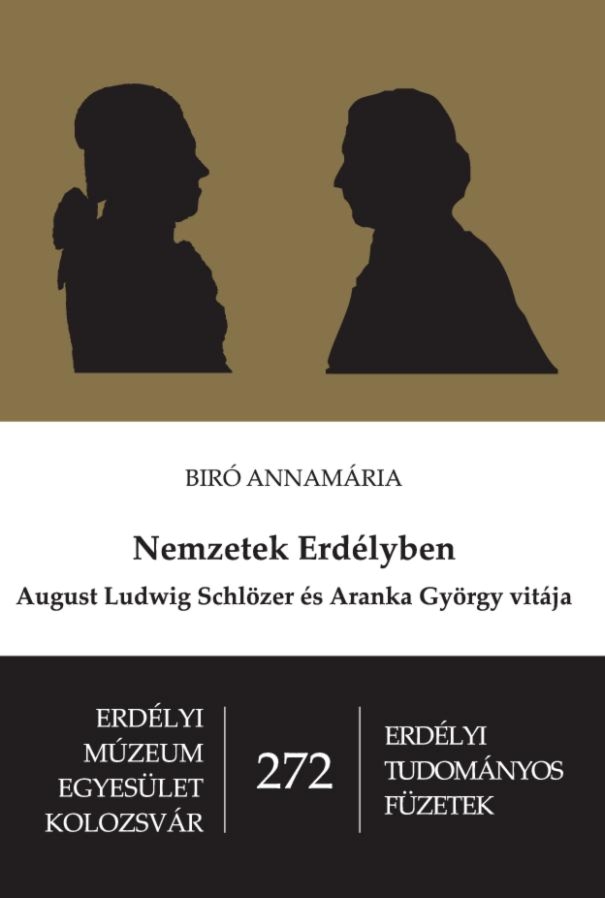
We kindly inform you that, as long as the subject affiliation of our 300.000+ articles is in progress, you might get unsufficient or no results on your third level or second level search. In this case, please broaden your search criteria.

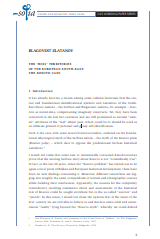
The present paper sheds light on the most important patterns of Macedonian political emancipation, from the period subsequent to the Congress of Berlin (1878) and prior to the Balkan wars (1912–1913). It focuses on a number of problems addressed by this volume: different modalities of nationalism (supranational, inter-national, etc.); paradigm shifts of national discourses; the relationship between confessional and national identities, and between ethnicity and different political ideologies (liberal, socialist). The timeframe is by no means arbitrarily chosen: while the so-called "Macedonian Question" was generally perceived, already in this period, as a result of a political setting provoked by the decisions taken in Berlin, the context that followed the first division of the region brought about different political commitments deserving further special attention and survey.
More...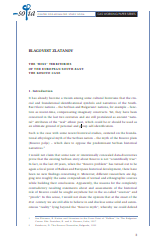
Preparadigmatic and early paradigmatic ethnographic imagination and practice played a crucial role in mid- and late 19th-century Hungarian nationbuilding. Different versions of national identity competed within the new discipline called ethnography. They used, translated, transformed, and remade the emerging discipline. In order to map these transformations, I will focus both on the ideological transfers and on the internal cleavages to simultaneously see the sources, and the reception of texts and phenomena that are used in the crossings and interactions of this disciplinary formation. At the same time, this train of thought is also a broad history of the early (preparadigmatic and early disciplinary) phases of Hungarian ethnography. As such, it will try to follow the history of the professionalization and „disciplinarization“ of ethnography along several shifts: from the mainly textual interest of Hungarian ethnography of the 1840s-1860s to the „visual turn“ and exhibition of folk objects of the 1870s, and to the complex interaction of the phenomena of tourism and ethnography in the last two decades of the 19th century. In following these shifts, it will attempt to understand and analyze how the emergence of this new discipline coincided with the rise of the nation-building process of modernity, and what were the consequences of their complex and multi-layered relationship.
More...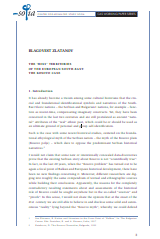
This paper deals with representative writings of an Ottoman intellectual, Shemseddin Sami Frashëri (1850–1904), who has simultaneously been represented in contemporary Turkey and Albania as one of the fathers of Turkish and Albanian nationalisms, respectively. Accordingly, he is known with two different names in these countries: „Sami Frashëri“ in Albania and „Şemseddin (or Şemsettin) Sami“ in Turkey. In order to avoid partisanship in this question, either his full name (as in the title) or the short version „Sami“ will be used in this paper.
More...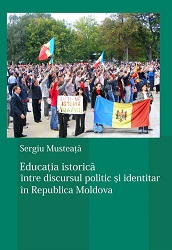
The work is the result of the project Geschichtslehrbücher zwischen politischer Propaganda, nationalistischen Konstruktionen und Wissenschaft. Untersuchungen zur Entwicklung des Schulfaches Geschichte in den posttotalitären Staaten Südosteuropas am Beispiel der Republik Moldau, der Ukraine und Rumänien started in 2005 and completed in 2008, implemented in partnership with „Georg Eckert” Institute for International Analysis of Textbooks and due to the financial support of „Gerda Henkel” Foundation, Germany.The work comprises the following parts: introduction, the role of history in society development, teaching history in the Republic of Moldova – between ideology and propaganda, conclusions and recommendations, sources and bibliography, summary in English and index of names, the main text being enriched with tables, annexes, and pictures.In Chapter I, The Role of History in Society Development, the author approaches several aspects regarding history as science, the relations between history and politics, the right of every citizen for access to authentic history, relations between history education and national identity, the role and importance of history in the system of education, the place of history curriculum in the national system of education and the importance of the school textbook in achievement of the educational objectives.In Chapter II, History Teaching in the Republic of Moldova: Between ideology and political propaganda, the following issues are discussed: the policy of the Communist Party in the Soviet times – pollution of history science, from the national idea to the national curriculum (1988/89-2001), development and publishing of the school history textbooks (1991-2009), history between reform and counter-reform (2001-2009) and history teaching in Transnistria separatist region.The author comes with the list of conclusions and recommendations. In the Republic of Moldova there is no unity and continuity in history teaching. Frequent interventions in history teaching have not allowed forming qualitative history education in citizens. For reconciliation in history teaching and historical content in the Republic of Moldova, some specific steps are to be taken in the following fields: politics, finance, and administration; publishing, curriculum design, and textbook development, as well as printing and dissemination of textbooks. Thus, the author recommends the Government of the Republic of Moldova: to carry out a series of actions through which they will ensure that education is a national priority; to provide a legal and legislative background for qualitative education; to develop mechanisms of public debates on educational policies; to bring contribution to the development of national publishing industry based on the principles of competition; to support research referring to textbook development and assessment; to promote and facilitate exchange of information regarding research in the field of curriculum and educational materials; to develop partnerships among governmental and non-governmental institutions expressed in partnership agreements, as well as agreements between two or more parties in the field of educational policies; to establish forms of regional cooperation in the field of history teaching in order to educate young generations for better understanding between neighbors; to promote mutual understanding among nations that would help understand everybody and fight prejudice and mutual outcast; to facilitate and encourage contacts among professional associations of historians and teachers at both the national and international level in order to allow exchange of experience, ideas, and suggestions on curricula, textbooks, teaching methods, and research in history.
More...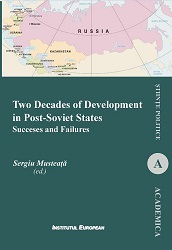
The book includes various chapters on post-soviet developments
More...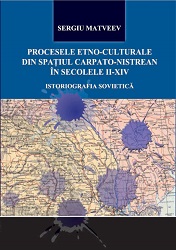
The book on soviet historiography of the ethnocultural processes in the Carpathian-Dniester
More...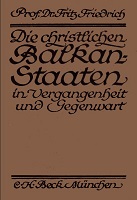
Published in 1916 by C. H. Beck (Munich)The small book offers the text of three lectures the author gave in Leipzig in November and December 1915. In the introduction, the author is noticing, that "among all the current war literature nowhere the topic of his book is really touched while, anyhow, whatever provides information is spread in numerous different works and articles." THE ORIGINAL BOOK IS PRINTED IN GERMAN FRAKTURA LETTERS. PLEASE HAVE A LOOK ON THE TABLE OF CONTENT TO MAKE SURE YOU'LL BE ABLE TO READ. The original has been published 2016 in Leipzig by C. H. Beck Publishing House.
More...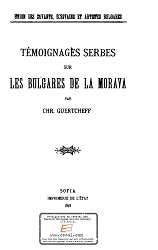
instead of an Abstract please read the" Introduction.PDF" of 2.5 pages which you can download free of charge from "Content" Tab here.
More...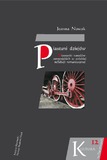
This monograph examines how Polish authors writing in the first half of the nineteenth century described these European nations which in their opinion played a significant role in the history of Europe through the past centuries. The nineteenth century authors were convinced that in each of the consecutive historical epochs, typically it was one nation that due to different circumstances acquired special importance and directed a general development. Such prominent communities, via a number of missions entrusted upon them, became the "keepers of the history," playing different functions that often overlapped: they were defenders of freedom, promoters of art and civilization, leaders of economic changes, or initiators of intellectual growth.
More...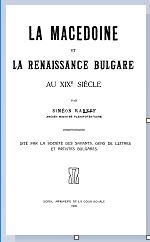
Editor 1918: La Société des Savants, Gens de Lettres er Artistes Bulgares. Author: Siméon Radeff has been former Minister of the Bulgarian Government.
More...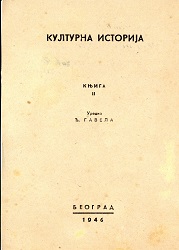
published by PROSVETA (Belgrade 1946). // This book is a selection from those articles by Tihomir Đorđević which present mostly cultural opportunities in Serbia a hundred years ago. The articles are taken from the books "Our People's Life", "The Serbia of King Milos" and from a literary supplement "Politika". All articles were published as published by Tihomir Djordjevic; only a few shorter places have been left out, which have a very close character. As the book is intended for a wider circle of readers, references and sources are reduced to a minimum.
More...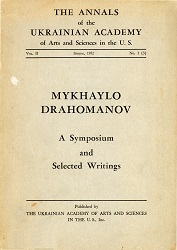
MYKHAYLO DRAHOMANOV. A Symposium and Selected Writings. Published in 1922 by the THE UKRAINIAN ACADEMY OF ARTS AND SCIENCES IN THE U. S. as an issue of the "ANNALS OF THE UKRAINIAN ACADEMY" // Compiled with the assistance of the Drahomanov Commission of the Ukrainian Academy of Arts and Sciences in the U. S. under the chairmanship of Professor Svitozor Drahomanov. Edited by Ivan L. Rudnytsky. // The problems which Drahomanov faced in his own day still await solution today. Perhaps a constructive approach may be gained through the study of a man who, like many Ukrainian scholars today, had to leave his native Ukraine and yet came to see more clearly her place in Europe. “Emigration,” Drahomanov wrote, “is bitter, but under certain circumstances, inevitable. Beginning with the sixteenth century the freedom of England, Scotland, then of France, Germany, Italy, and Hungary could not do without emigration and its literature. The freedom of the Ukraine also demands it” (Letters to the Dnieper Ukraine). // The present volume which is published as a special issue of the Annals presents a symposium of studies devoted to Mykhaylo Drahomanov and a selection from his own works. It is intended to acquaint the English speaking world and in particular American and English students of East European history with the life and work of Drahomanov.
More...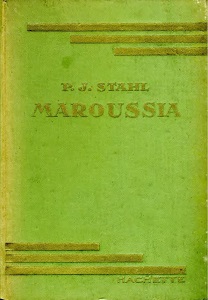
Marko Vovtchok (Ukrainian and Russian: Марко Вовчок), is the male pseudonym of Maria Aleksandrovna Vilinska (in russian: Мария Александровна Вилинская; in Ukrainian: Марія Олександрівна Вілінська). Born December 10, 1833 (December 22, 1833 in the Gregorian calendar) and died July 28, 1907 (August 10, 1907 in the Gregorian calendar), she was a Ukrainian-born Russian writer and translator, and one of the first women of Ukrainian Literature. Often mentioned in France under the name Marko Wovzog, she is known to the French-speaking public thanks to Maroussia, one of her Ukrainian short stories that the publisher Pierre-Jules Hetzel adapted into a novel. Very successful in bookstores in France, this patriotic novel was awarded the Montyon prize from the French Academy in 1879. Translated into several European languages, it was regularly republished in France until 1980.
More...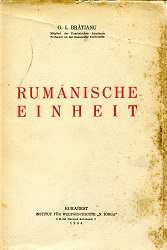
from the introduction: Some time ago, the excellent French publishing house Armand Colin published the small handbooks by G. Dupont-Ferrier on the formation of the French state and French unity, by G. Bourgin on the formation of Italian unity, and later this collection was supplemented by »Die deutsche Einheit« completed by P. Benaerts. Based i those volumes it seemed necessary to me to also prepare a work on Romanian unity, which was clearly the main problem of national history ... I hastily wrote a small book entitled "A riddle and a miracle of history: the Romanian people". , in which I was obliged to reopen the problem, so often discussed for more than a century, of the origin of a nation whose obscure past during the first centuries of the Middle Ages made the all too easy saying that peoples who have no history are happy, so strikingly refuted. Several editions that this work has undergone (French, Romanian, German and Italian) have proved its usefulness. [published in 1944 in Bucharest by the »N. Iorga Institute for World History«]
More...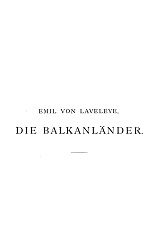
My path leads me again to the Slav peoples of the Danube and Balkan countries. I want to see how the Zadrugas — the home or family communities — which excited me so much on my journey in 1867, have changed since then. Leroy-Beaulieu and Moritz Block severely criticized my antiquated conception of those venerable communities, while Stuart Mill shared it and Henry Maine understood it. Under Bishop Strossmayr's guidance, I will first inspect the Zadrugas of Slavonia in the Djakovo area, then I will continue my observations in Bosnia, Serbia and Bulgaria, learning about the political and economic situation of these countries, which I have already discussed in my book »Prussia and Austria since Sadowa«. The favorable opportunity to undertake such investigations must be seized without hesitation, because a rapid transformation is taking place under the influence of railways, new constitutions and closer ties with Western Europe. The inhabitants of those countries will soon exchange their peculiar, hundred-year-old customs and customs, their picturesque costumes for what ist usually called modern civilization, and then regulate their whole way of thinking and living in the manner of Paris or London. I hear tremendous changes have taken place since 1867. (From the author's introduction)
More...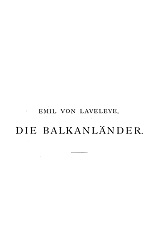
Since the publication of the first volume of my book on the Balkans, everyone has been looking at them with growing fear. It is feared that a clash is taking place there between the Russians and Austrians, affecting all the peoples of Europe and North Asia, from Mount Etna to the North Cape and from the Atlantic Ocean to the distant shores of the Pacific and the mouths of the Amur. But how can the events in Bulgaria, which is so far away, threaten the peace that all peoples and, it seems, all princes want to keep? Well, we are standing at a turning point in history, where the die is to be cast that will decide the fortunes of the East and consequently also of the West. (From the author's introduction)
More...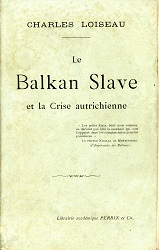
This book was begun when public attention, held for more than a year by the affairs of Armenia, Crete and the Greco-Turkish conflict, was suddenly brought back to the Austrian crisis. Its object being to present, not only the Serbs, the Montenegrins and the Bulgarians, but all the South Slavic race, spread from the Black Sea to Trieste, to the state of entity, of ethnic individuality, if the we can say, finally, one by origin, tendencies, interests and international function, - we can well admit that because of certain folds of the Western spirit it seemed to us several times of a difficult realization. On the one hand, it was necessary to insist on the ethnographic data and to put forward one of those theories of “nationalities” which fascinated the generation of 1848, even that of 1860, but are now considered outdated. On the other hand, it was necessary to break with certain usual classifications, which are above all inspired by the outline of the political border: we are used to considering that the "Balkan" begins at the precise point where the Empire ends. of the Habsburgs, and no more solidarity is admitted between these two worlds than between the so-called "Austrian" questions and the Eastern question. (From the author’s introduction) ORIGINALLY PUBLISHED IN1898 BY PERRIN ET CIE, LIBRAIRES-ÉDITEURS, PARIS
More...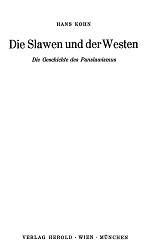
Title of the American Original: «Pan-Slavism. Its History and Ideology», published by University of Notre Dame Press, Notre Dame, Indiana, USA. German edition published in 1956 by HEROLD Verlagsgesellschaft, Vienna-Munich, authorised translation to German by Dr. Helge Pross
More...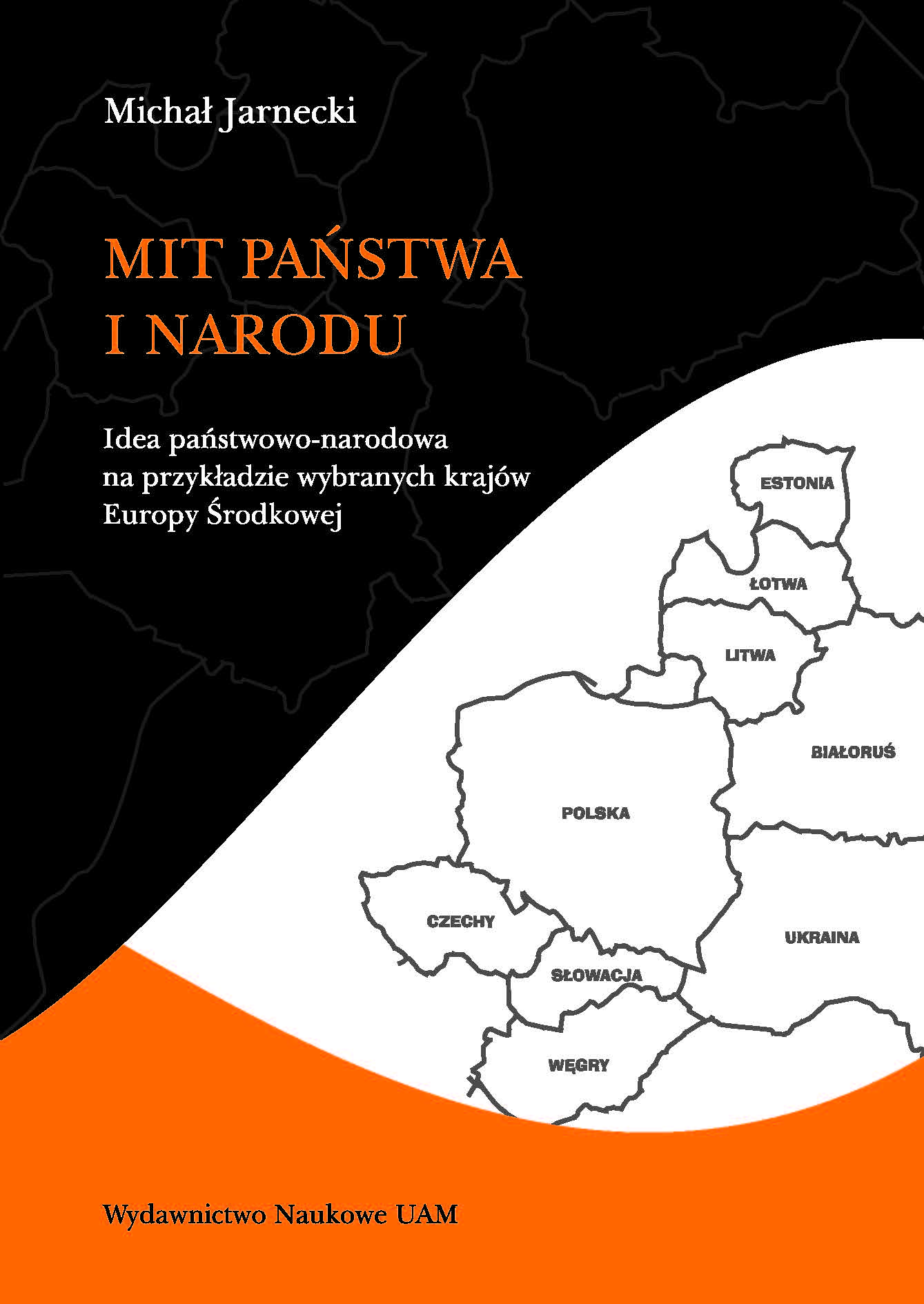
The book summarises the author's own research into the history of Central Europe, the Polish-Czech-Ukrainian triangle and the cultural heritage of Poland, Ukraine and Belarus. It raises the vital and topical issue of the state myth, the national idea, and nationalism in selected Central and Eastern European countries (Poland, the Baltic States, the Czech Republic, Slovakia, Hungary, Ukraine and Belarus). Although there is much that divides these countries, they also have many things in common. Together, they emerged as independent after the First World War and faced two totalitarianism systems. They have gone on to build a system of liberal democracy, even though the pressure of current problems and the shadow of history gives populism a chance. Starting from definitions and conceptual issues, the author traces recent history through concrete examples, focuses on the 20th century, and reaches where necessary into the more distant past. He shows how the aspiration to gain or regain independence, the national idea and the myth of the ethnic state, shaped and strengthened the consciousness of the analysed communities. In the final chapters, he presents Ukrainian and Belarusian issues, two routes out of the sphere of Russian influence, albeit one unsuccessful. Ukraine, on the other hand, although bathed in blood by the onslaught of its neighbour to the east, seems to be surviving and strengthening its statehood and, ultimately, building a nation.
More...